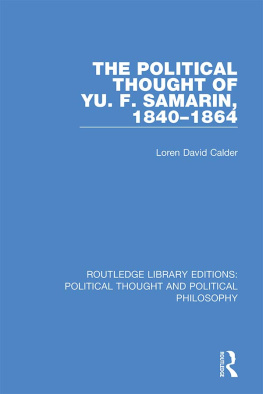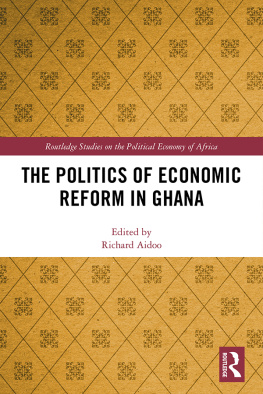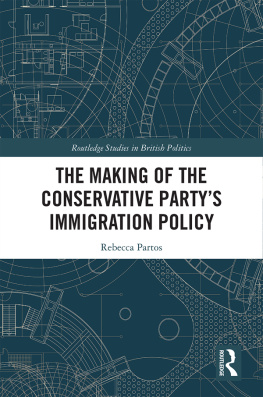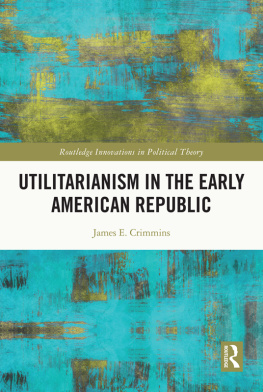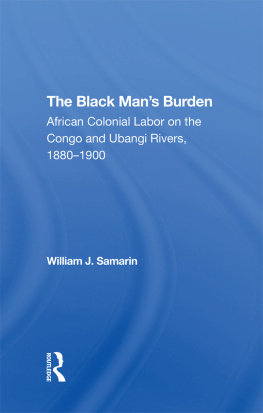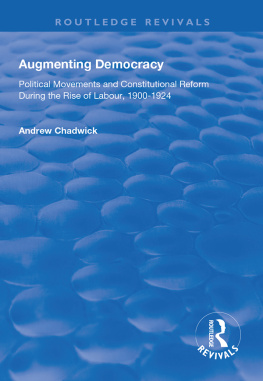ROUTLEDGE LIBRARY EDITIONS:
POLITICAL THOUGHT AND POLITICAL PHILOSOPHY
Volume 9
THE POLITICAL THOUGHT OF YU. F. SAMARIN, 18401864
THE POLITICAL THOUGHT OF YU. F. SAMARIN, 18401864
LOREN DAVID CALDER
First published in 1987 by Garland Publishing, Inc.
This edition first published in 2020
by Routledge
2 Park Square, Milton Park, Abingdon, Oxon OX14 4RN
and by Routledge
52 Vanderbilt Avenue, New York, NY 10017
Routledge is an imprint of the Taylor & Francis Group, an informa business
1987 Loren David Calder
All rights reserved. No part of this book may be reprinted or reproduced or utilised in any form or by any electronic, mechanical, or other means, now known or hereafter invented, including photocopying and recording, or in any information storage or retrieval system, without permission in writing from the publishers.
Trademark notice: Product or corporate names may be trademarks or registered trademarks, and are used only for identification and explanation without intent to infringe.
British Library Cataloguing in Publication Data
A catalogue record for this book is available from the British Library
ISBN: 978-0-367-21961-1 (Set)
ISBN: 978-0-429-35434-2 (Set) (ebk)
ISBN: 978-0-367-24322-7 (Volume 9) (hbk)
ISBN: 978-0-429-28176-1 (Volume 9) (ebk)
Publishers Note
The publisher has gone to great lengths to ensure the quality of this reprint but points out that some imperfections in the original copies may be apparent.
Disclaimer
The publisher has made every effort to trace copyright holders and would welcome correspondence from those they have been unable to trace.
The Political Thought of Yu. F. Samarin, 18401864
Loren David Calder
Copyright 1987 by Loren David Calder
All rights reserved
Library of Congress Cataloging-in-Publication Data
Calder, Loren David, 1929
The political thought of Yu. F. Samarin,
18401864.
(Modern European history)
Originally presented as the authors thesis
(Ph. D.University of London, 1980)
Bibliography: p.
1. Samarin, I.. (Ir edorovich), 18191876
Contributions in Political science. 2. Conservatism
Soviet UnionHistory19th century. 3. Political
participationSoviet UnionHistory19th century.
I. Title. II. Series.
JC248.S25C34 1987 320.50924 87-7546
ISBN 0-8240-8052-1 (alk. paper)
All volumes in this series are printed on acid-free,
250-year-life paper.
Printed in the United States of America
TABLE OF CONTENTS
The general purpose of this thesis is to examine the political thought of Yu. F. Samarin as set out in his writings from 1840, when he was a student at the University of Moscow engaged in writing a Masters thesis, to 1864 when he completed his work on the Great Peasant Reform. Samarins status as the most outstanding Slavophil statesman, his lifelong preoccupation with political questions and his stellar performance as propagandist, polemicist and reformer establish his political thought as a credible subject for investigation. The fact that no book-length piece has been written on Samarins political thought in any language, makes it a desirable subject for investigation and the fact that no full-length study of Samarin at all has been written in the English language to date gives it very real potential value for British and North American students of Russian affairs.
The specific purposes of this thesis are: (1) to complete a thorough, comprehensive and systematic summarization of Samarins political thought; (2) to organize and to explain his political thought; (3) to establish on this basis his position on the broad spectrum of political opinion; and (4) to attempt an assessment of his stature as a political theorist. In short, this thesis is to be a systematic typological enquiry in the classical tradition.
The organizational framework of this study is chronological for two main reasons. On the one hand, Samarins life and thought divide into neat segments on the basis of his evolving interests. On the other hand, he was not a political thinker in the tradition of great theorists like Plato, Aristotle and Hobbes who analyzed the state and other political institutions as well as the norms and goals of political activity in the process of creating theoretical systems, but a thinker who analyzed and wrote about current political issues as his interests and experience dictated, scattering his political ideas throughout the whole corpus of his work in a relatively unsystematic way.
The chronological limitations imposed on the investigation are both logical and desirable for the following reasons. First, the objective of being thorough and comprehensive does not mesh well with the scope of Samarins political activities and the prolific output of his pen. Second, on Samarins own testimony his theoretical position was firmly established by 1848,i and his energies were consciously expended to implement its elements in concrete reform measures altering age-old landlord-peasant relationships. Thus his work on the Great Peasant Reform can be seen as a laboratory test case for his political ideas and a suitable point at which to terminate this study of his political thought.
The adjective political is a complex word. It has not had, and does not now have a precise, narrowly definable meaning. The Shorter Oxford Dictionary defines political as of, belonging or pertaining to, the state, its government and policy; public, civil; of or pertaining to the science or art of politics. For Plato, not only government, but every important relationship in society had political significance.ii Presumably, therefore, almost any concatenation of topics focussing on societal relationships of consequence demographic shifts, poverty, ideological strife, racial discord, class conflict, governmental structure, freedom of expression, economic equality, religious toleration, public order, law enforcement, transfer of power identifies political issues. Aristotle argued that every political association involves authority or rule, and his influence has been so pervasive that it has generally been accepted since his time that a political relationship in some way involves authority, ruling, or power.iii Count Metternich, the famous Austrian Chancellor, associated politics with the relationships between states:
Politics is the science of the vital interests of States, in its widest meaning. Since, however, an isolated State no longer exists and is found only in the annals of the heathen world we must always view the Society of States as the essential condition of the modern world. The great axioms of political science proceed from the knowledge of the true political interests of all States; it is upon these general interests that rests the guarantee of their existence. The establishing of international relations on the basis of reciprocity under the guarantee of respect for acquired rights constitutes in our time the essence of politics, of which diplomacy is merely the daily application. Between the two there is in my opinion the same difference as between science and art.iv
iSee p. 233 above.
iiSheldon S. Wolin, Political Theory-Trends and Tools, International Encyclopedia of the Social Sciences , David L. Sills, ed., (New York: The Macmillan Company and The Free Press, 1968), p. 324.

